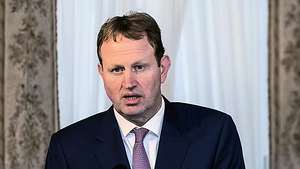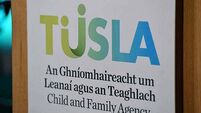Explained: What are the new immigration rules?

Ottoline Spearman
Minister for Justice Jim O'Callaghan announced new immigration rules on Wednesday. These relate to asylum, citizenship, and family reunification.
Mr O'Callaghan has said that this will bring in a new "rules-based" and "efficient" system.
Legislation will be required to implement many of these changes, and officials have said they have started to develop a bill.
However, the family reunification changes will take immediate effect.
But what are the proposed changes, what do they mean for immigrants and their families?
Family Reunification
The revised family reunification policy sets out how Irish citizens and most non-EEA Irish residents (not including most international protection beneficiaries or EEA Citizens) may apply to bring family members to live with them in Ireland.
Irish citizens and eligible non-EEA citizens will still be able to be joined by their immediate non-EEA family members (spouses, partners and children under 18), but strict limits will be placed on other family members.
This includes, for the first time, application fees, new accommodation requirements, and an income assessment that only includes the earnings of a single sponsor.
The new rules will also reduce the effective waiting period for those on General Employment Permits, and will give permission to work for 16-18-year-olds.
Changes to legislation will also ensure that family reunification for those granted International Protection status will only be granted in cases where it can be shown they have sufficient resources to support family members.
Responding to the changes, Susan Fitzgerald of trade union Unite said: “The cynicism of this policy is staggering. On the one hand, the government mandates poverty pay for non-EEA healthcare assistants. On the other hand, they have retained unrealistically high salary thresholds for a worker to bring over their spouse and children, knowing full well that these vital workers cannot bridge the gap.
"To add insult to injury, an application fee is also being introduced, while applications will only be assessed on a single income. This amounts to enforced family separation.”
IPAS residents
Residents of international protection accommodation in employment will need to make a financial contribution towards their accommodation of up to 39.6 per cent of their income.
The potential payments could range from €15 a week for those earning between €97.01 and €150 a week, to €238 a week for anyone earning more than €600 a week.
The scheme will be implemented within a planned 12-month period.
Social Democrats TD Gary Gannon said on Newstalk: "The best outcome for a person who's in IPAS is if they get themselves out. This is not going to do that when you're charging them up to 40% of a very meagre income.
"They're not going to be able to access the private rental market. We've already got over 5,000 people in IPAS accommodation who've been granted status but who cannot find housing."
Refugee status and citizenship
There will be additional powers to revoke refugee status where a person is found to be a danger to the security of the state or has been convicted of a serious crime.
Citizenship criteria will be tightened to ensure that applicants meet the "good character" requirement and that the interpretation of that criterion is clearer.
Citizenship applicants will need to be self-sufficient, and applicants will no longer be allowed to receive certain social protection payments in the two years before they apply for citizenship.
Furthermore, those who are granted international protection will need to be resident in Ireland for five years - up from three - to qualify for citizenship.
CEO of the Irish Refugee Council Nick Henderson described the changes as "political posturing" and "deeply alarming".
"They severely undercut two key pillars of refugee integration: a clear route to citizenship and the ability to reunite with family. The government asks refugees to integrate, but is removing their ability to do so.
"The reported proposal that a person must not be in receipt of certain social protection payments within the previous two years before an application is made is deeply concerning.
"Under this rule, a refugee seeking citizenship would be forced to make a choice: avoid all social supports — regardless of ill health, disability, pregnancy, sudden job loss or any other legitimate need or seek that support and jeopardise a citizenship application.
"Placing people in an invidious catch-22 like is deeply irresponsible.”




